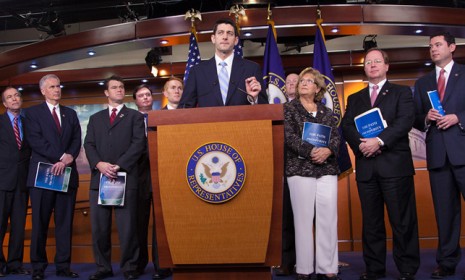Paul Ryan's 'austerity' budget: What would it cut?
The Republican House Budget Committee chairman proposes broad reductions in social spending... but he's not looking for savings everywhere

A free daily email with the biggest news stories of the day – and the best features from TheWeek.com
You are now subscribed
Your newsletter sign-up was successful
The budget wars are on again in Washington, with Democrats and Republicans clashing over House Budget Committee Chairman Paul Ryan's latest "austerity" budget. Ryan (R-Wis.) is proposing spending $5.3 trillion less over the coming decade than President Obama has suggested in his budget. The White House says Ryan is trying to give the rich a big tax cut, and paying for it by slashing spending on programs that benefit the poor. Fiscal conservatives are attacking Ryan from the right, saying deeper cuts are needed to balance the budget quicker. What exactly does Ryan want to cut? Here, a brief guide:
Where is Ryan focusing his cuts?
As it was the last time around, the centerpiece of Ryan's plan is his proposal to transform Medicare into a system of subsidized private insurance plans — only this time he's suggesting offering seniors the option of buying into the traditional "fee-for-service" program. Over the next 10 years, Ryan's plan would shave $205 billion in Medicare spending. Then more savings would roll in as the Medicare eligibility age gradually climbed from 65 to 67. Ryan hopes to save another $810 billion in federal spending on Medicaid over the next decade. But he's proposing even bigger cuts elsewhere.
The Week
Escape your echo chamber. Get the facts behind the news, plus analysis from multiple perspectives.

Sign up for The Week's Free Newsletters
From our morning news briefing to a weekly Good News Newsletter, get the best of The Week delivered directly to your inbox.
From our morning news briefing to a weekly Good News Newsletter, get the best of The Week delivered directly to your inbox.
What programs would face the biggest reductions?
All of the government's entitlement programs, including welfare, food stamps, agricultural subsidies ($30 billion), and transportation, would come under the chopping block. Together, they'd account for $2 trillion in spending cuts. Ryan's plan — which, by the way, has essentially zero chance of passing in the Democratic-controlled Senate — calls for spending 13 percent less on veterans, 6 percent less on science, space, and technology, and 25 percent less on transportation projects, such as upgrading roads and bridges.
Where does Ryan want to spend more?
Ryan's budget would increase defense spending over what Obama has proposed, pushing spending in 2013 from $546 billion to $554 billion, and shield the Pentagon from $500 billion in cuts triggered when the congressional super committee failed to reach a deficit reduction deal last year.
A free daily email with the biggest news stories of the day – and the best features from TheWeek.com
What about taxes?
The biggest example of Ryan's budgetary largesse comes from his simplification of the tax code, eliminating the Alternative Minimum Tax, and collapsing the top individual and corporate tax rates to 25 percent. Ryan says the moves would fuel economic growth while reducing deficit spending. The White House says Ryan wants to "shower the wealthiest few Americans with an average tax cut of at least $150,000," and House Democratic Leader Nancy Pelosi says he's shifting a greater share of health-care costs to seniors and letting "Medicare wither on the vine."
Sources: The Hill, The Nation, The New York Times, The Wall Street Journal, The Washington Post
-
 American universities are losing ground to their foreign counterparts
American universities are losing ground to their foreign counterpartsThe Explainer While Harvard is still near the top, other colleges have slipped
-
 How to navigate dating apps to find ‘the one’
How to navigate dating apps to find ‘the one’The Week Recommends Put an end to endless swiping and make real romantic connections
-
 Elon Musk’s pivot from Mars to the moon
Elon Musk’s pivot from Mars to the moonIn the Spotlight SpaceX shifts focus with IPO approaching
-
 The billionaires’ wealth tax: a catastrophe for California?
The billionaires’ wealth tax: a catastrophe for California?Talking Point Peter Thiel and Larry Page preparing to change state residency
-
 Bari Weiss’ ‘60 Minutes’ scandal is about more than one report
Bari Weiss’ ‘60 Minutes’ scandal is about more than one reportIN THE SPOTLIGHT By blocking an approved segment on a controversial prison holding US deportees in El Salvador, the editor-in-chief of CBS News has become the main story
-
 Has Zohran Mamdani shown the Democrats how to win again?
Has Zohran Mamdani shown the Democrats how to win again?Today’s Big Question New York City mayoral election touted as victory for left-wing populists but moderate centrist wins elsewhere present more complex path for Democratic Party
-
 Millions turn out for anti-Trump ‘No Kings’ rallies
Millions turn out for anti-Trump ‘No Kings’ ralliesSpeed Read An estimated 7 million people participated, 2 million more than at the first ‘No Kings’ protest in June
-
 Ghislaine Maxwell: angling for a Trump pardon
Ghislaine Maxwell: angling for a Trump pardonTalking Point Convicted sex trafficker's testimony could shed new light on president's links to Jeffrey Epstein
-
 The last words and final moments of 40 presidents
The last words and final moments of 40 presidentsThe Explainer Some are eloquent quotes worthy of the holders of the highest office in the nation, and others... aren't
-
 The JFK files: the truth at last?
The JFK files: the truth at last?In The Spotlight More than 64,000 previously classified documents relating the 1963 assassination of John F. Kennedy have been released by the Trump administration
-
 'Seriously, not literally': how should the world take Donald Trump?
'Seriously, not literally': how should the world take Donald Trump?Today's big question White House rhetoric and reality look likely to become increasingly blurred